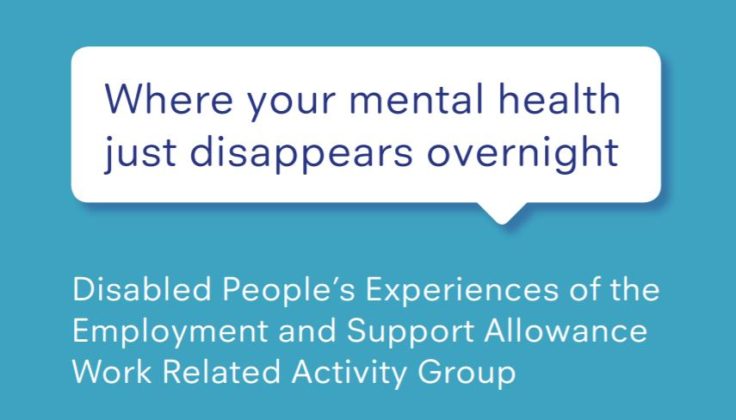Sanctions are pushing disabled people further from employment
New report on the Employment and Support Allowance (ESA) system

Deaf and disabled people are facing punitive sanctions and perverse incentives when trying to claim allowances which are damaging their health and placing barriers in the way of their efforts to seek work.
Researchers at the University of Essex will publish their findings today after working in partnership with the Deaf and Disabled People’s Organisation, Inclusion London, to investigate the Employment and Support Allowance (ESA) system.
Their findings will be launched at an event in Parliament hosted by the disabled cross-bench peer Baroness Tanni Grey-Thompson. You can download the report here: ESA-WRAG-Report
The researchers explored disabled people’s experience of being placed in the ESA’s Work Related Activity Group (WRAG) after a Work Capability Assessment. WRAG claimants are deemed suitable for some work related activity and failure to engage can lead to ESA payments being cut or ‘sanctioned’.
The research team found all participants experienced significantly detrimental effects on their mental health.
The impact of sanctions was life threatening for some. For many, the underlying fear from the threat of sanctions meant living in a state of constant anxiety. This state of chronic fear can make it harder for people to engage in work-related activity and was made worse by the unpredictable way conditionality was applied, leaving some participants unsure of how to avoid sanctions.
Ellen Clifford, Campaigns and Policy Manager at Inclusion London, said: “This important research adds to the growing weight of evidence that conditionality and sanctions are not only harmful to individuals causing mental and physical negative impacts, but are also counter-productive in their aim of pushing more disabled people into paid work.
“Universal Credit, which is set to affect around 7 million people with 58% of households affected containing a disabled person, will extend and entrench conditionality. This is yet another reason why the roll out of Universal Credit must be stopped and a new system designed based on evidence based approaches and co-produced with disabled people and benefit claimants.”
The results also showed that participants wanted to engage in work and many found meaning in vocational activity. However, the WRAG prioritised less meaningful tasks.
In addition, rather than incentivising work-related activity, conditionality meant participants were driven by a range of perverse and punitive incentives, being asked to engage in activity that undermined their self-confidence and required them to understate their previous achievements.
Dr Danny Taggart, Lecturer in Clinical Psychology at the University of Essex, said “Based on these findings, the psychological model of behaviour change that underpins conditionality and sanctioning is fundamentally flawed. The use of incentives to encourage people to engage in work related activity is empirically untested and draws on research with populations who are not faced with the complex needs of disabled people. The perverse and punitive incentives outlined in this study rendered participants so anxious that they were paradoxically less able to focus on engagement in vocational activity.
“More research needs to be undertaken to understand how to best support disabled people into meaningful vocational activity, something that both the government and a majority of disabled people want. This study adds further evidence to support any future research being undertaken in collaboration with disabled people’s organisations who are better able to understand the needs of disabled people.”
Charlie’s case
Charlie (not his real name), one of the study participants, attempted suicide after having to return to the Job Centre for an appointment with the same adviser who had sanctioned him, leaving him with no money for food over Christmas.
Charlie said: “I’ve thought about what that sanction meant to me. I always thought I was a strong man but in a few short weeks after being sanctioned I fell apart and my mental health and self-esteem has never been the same. We hear about how a sanction impacts on mental and physical health but to me it went further than that, it has had a deeply negative impact on my whole sense of identity.”
Notes for Editors
1) Inclusion London is a London-wide Deaf and Disabled People’s Organisation (DDPO) which is part of the Reclaiming Our Futures Alliance, a network of grassroots DDPO and disabled people led campaigns across England. https://www.inclusionlondon.org.uk/
2) People seeking support through Employment and Support Allowance (ESA) must go through a Work Capability Assessment (WCA). After assessment, eligible claimants are assigned to either the Work-Related Activity Group (WRAG) or the Support Group (SG). WRAG claimants are deemed suitable for some work related activity and failure to engage can lead to ESA being cut or ‘sanctioned’. This sanction can involve losing up to 100% of ESA if work related activity is not completed to the satisfaction of the Job Centre Plus worker. Under Universal Credit, the ESA WRAG is called the Limited Capability for Work group (LCW).